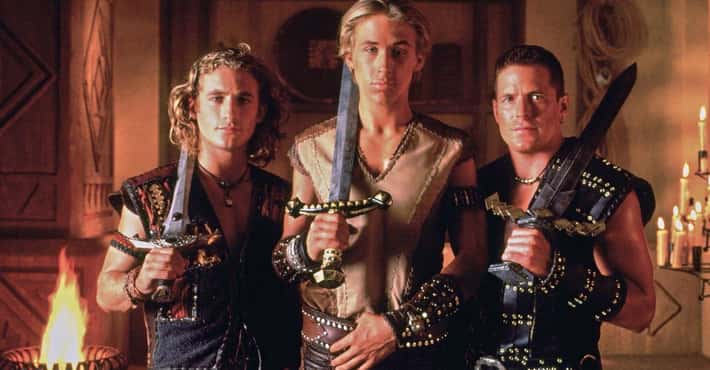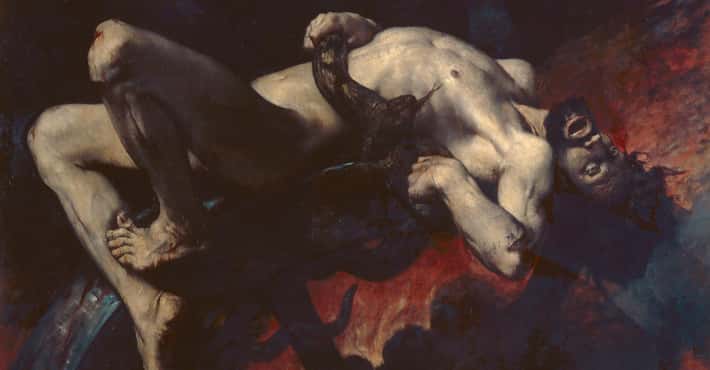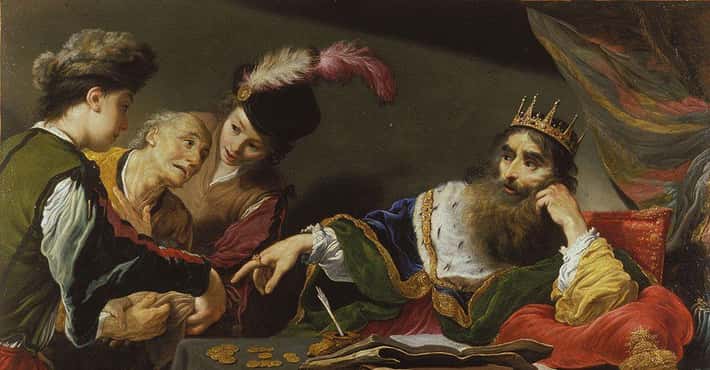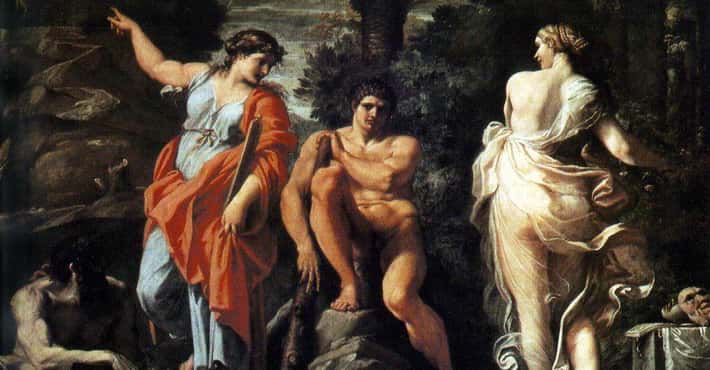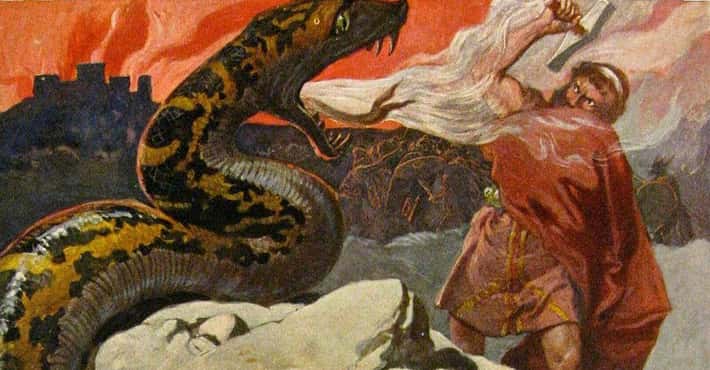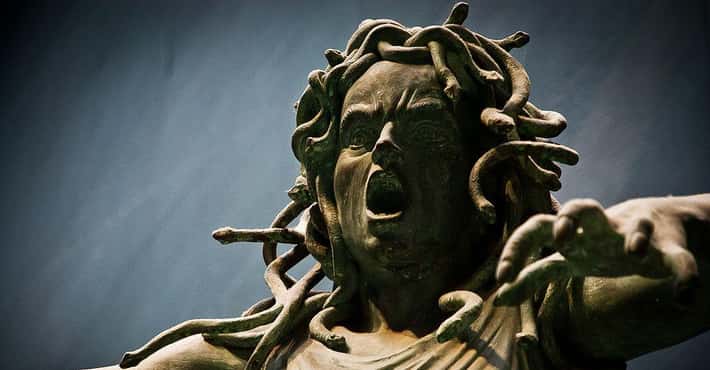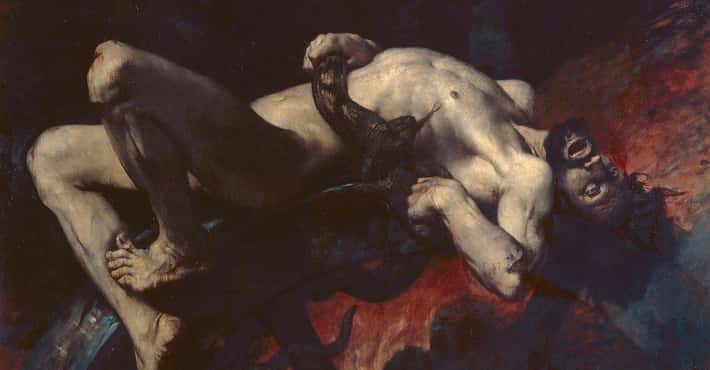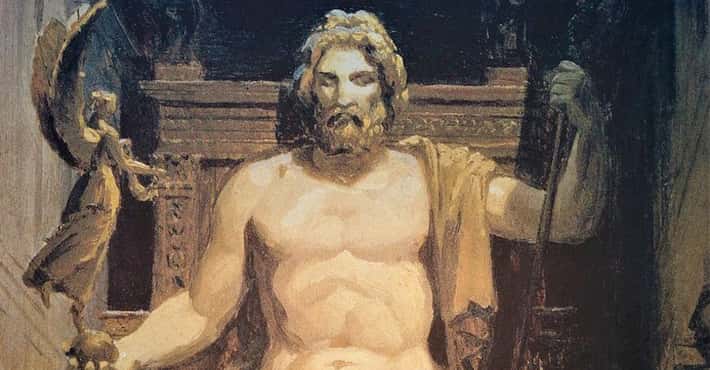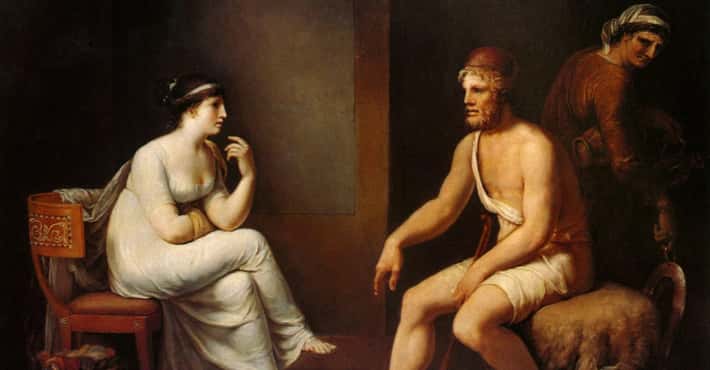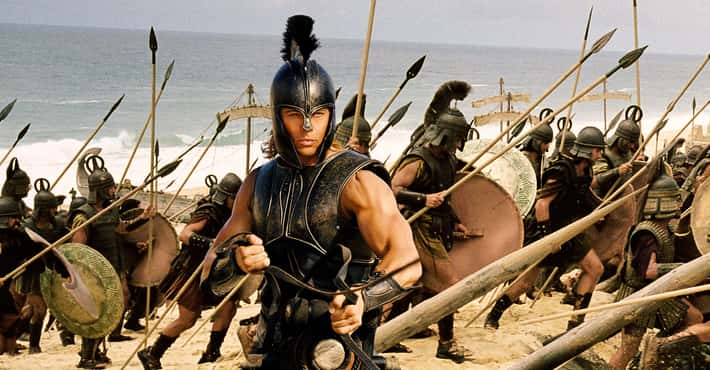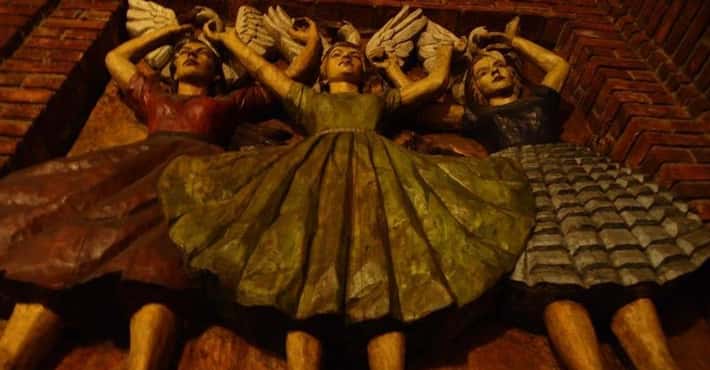
- Photo:
- Francesco Albani
- Wikimedia Commons
- Public domain
The Most Powerful Greek Gods, Ranked By Their Mythical Might
Vote up the Greek gods that turned their strength into legend.
Myths about ancient Greek gods and goddesses may be thousands of years old, but they are just as compelling as they were when they were first told. That’s partly because the deities themselves are just so memorable.
The Greek goddesses and gods are all unique, and each has their own arsenal of stories that highlight their personality. Like humans, deities have both positive and negative qualities, which often feature in their myths. Zeus, for example, saved his siblings in the most unexpected way imaginable – but his frequent extramarital affairs cause conflict with his wife. Some of these myths are brutal, while others are surprisingly wholesome or just downright weird.
The gods of Mount Olympus aren’t the only immortals that feature in Greek mythology. But for the purposes of this list, no Titans or primordial gods were considered.
- 1130 VOTES
Duties: Athena was a deeply respected goddess in ancient Greece, likely because she personifies something high on their list of values: wisdom. She serves as the protector of Athens and is also the goddess of craftsmen and warfare, possessing a brilliant military mind capable of out-strategizing the god of war himself.
Pros: Make no mistake: Athena's biggest strength is her fierce intelligence. She can also be loyal by protecting and supporting those whom she believes in, like Odysseus, Hercules, and Perseus. She's also well-rounded and enjoys sewing and farming as much as she enjoys the battlefield.
Cons: Zeus favors Athena above all his other (many) children, and there is nothing more annoying than the favored child. She's also seen as the personification of civilization, so it isn't a stretch to imagine her as a bit arrogant or holier-than-thou. Though known for keeping a cool head, she exhibits her stone-cold deceptiveness during the Trojan War. She disguised herself as the Trojan hero Hector's beloved brother, and fooled him into thinking that he could fight Achilles one-on-one. Hector died due to Athena's deception.
Most Memorable Myth: How did Athena give the city of Athens its name? She won the naming rights. Both Athena and Poseidon wanted to claim the city as their own. So they entered into a friendly competition: present the city with a gift. The deity who presented the most useful gift would win and earn the right to protect the city.
Poseidon gave the city a spring. But it was a saltwater spring, so they couldn't do much with it. Athena gave them an olive tree, which would continue to nourish them. It was a gift that kept on giving.
And so Athena won and named the city “Athens.”
- 2173 VOTES
Duties: Zeus rules as a king of the gods from Mount Olympus, the tallest mountain in Greece. Zeus can brew storms, and he wields lightning bolts as his weapon of choice.
Pros: Zeus may be king of the gods but that doesn't mean he is disinterested in humans. In fact he is very invested and wants to see civilization succeed. He is committed to the idea of justice, truth, and is a stickler for hospitality etiquette. Many see him as a protector of some of society's most vulnerable members, including beggars.
Cons: In many myths, Zeus is always falling in and out of love or scheming to hook up with whomever strikes his fancy. He often uses disguise and trickery to accomplish this. Zeus doggedly pursues his extramarital affairs without any regard to the feelings of his wife Hera. Furthermore, his interest in human affairs means that he sometimes intervenes, robbing people of their agency.
Most Memorable Myth: Zeus was born to the deities Rhea and Cronus, king of the titans. The couple already had numerous children – but none of them were alive. That's because Cronus insisted on gobbling down every single one of his newly born children. He had heard a prophecy that his children would overthrow him, and he certainly didn't want that to happen. So, he ate them.
Rhea didn't want baby Zeus to share the same fate as his older siblings. So she swaddled a rock and handed it to Cronus, who gulped it down. Rhea then spirited Zeus away to safety, far from his father. Kind nymphs raised the young god.
Zeus eventually returned and had a showdown with Cronus by making him vomit up the children he had consumed. One after another, all of Zeus's older siblings sprang from their father. They joined forces against Cronus, ultimately defeating him.
- 3155 VOTES
Duties: Hades rules over the underworld and his subjects are the souls of the dead.
Pros: Everyone will come to Hades eventually. One of the objects associated with Hades is a helmet that renders the wearer invisible, underlining his role as ruler of an unseen spirit world. He sometimes bends his rules if he thinks he has just cause.
Cons: Hades is far from the most popular god. In fact, he doesn't even reside on Mount Olympus. Instead, he lives in the underworld. His kingdom is not generally a happy place and is guarded by a three-headed dog named Cerberus. He gives deceased people no opportunity to return to Earth once they enter his realm.
Most Memorable Myth: The musician Orpheus fell in love with Eurydice. Tragically, a snakebite prematurely took her life, and she traveled to Hades. Consumed with grief, Orpheus followed her into the underworld, hoping that he could bring her back to the land of the living. Orpheus used his gift for music to win over Hades. The god agreed that Eurydice could leave with her husband.
But there was a catch: Eurydice would have to walk behind Orpheus the whole way, and he could not turn around to look at her. Orpheus would just have to trust she was behind him. He agreed, and the couple began their journey home.
Unfortunately, Orpheus couldn't help himself and, at the last minute, turned to look at Eurydice only to see her vanish back into the underworld.
- 4158 VOTES
Duties: Poseidon rules the sea. He makes full use of his kingdom by stirring up storms or fair weather. He is the protector of sailors, who eagerly pray to him in the hopes that he will grant them smooth sailing.
Pros: Though Poseidon is king of the ocean, he is associated with horses – he fathered Pegasus, the flying horse – and he uses a chariot to travel around the sea. He carries a trident, which adds a hint of majesty to his figure. He can also be generous, such as the time he created a constellation in honor of the dolphin Delphinus in thanks for his help in convincing his wife to come home.
Cons: Poseidon can be fickle and turn the sea on a dime. He is also fond of using his resplendent trident to create earthquakes.
Most Memorable Myth: Poseidon and his nephew Apollo teamed up to create walls for the city of Troy. But the Trojans never settled the bill for the construction project. Furious, Poseidon sent a sea monster to attack the city.
- Photo:
- Hans Thoma
- Wikimedia Commons
- Public domain
5109 VOTESAres, God Of War
Duties: Agile, strong, and bombastic, Ares is war personified.
Pros: Ares has never met a battle he isn't willing to face – he would be the right delegate for a brawl. He also represents some of the glory of war. His official animal is the dog, which is a significant plus.
Cons: The Greeks actually weren't overly fond of Ares, since he represented all of the ugliness that came with war. Indeed, he lives for battle and loves some of the things most people hate about it: extreme bloodshed. For the most part, Ares is all brawn, not necessarily brains – he isn't someone who should be tasked with drawing up a strategy. His posse includes Terror, Trembling, and Panic. According to mythologist Edith Hamilton, “As they move, the voice of groaning arises behind them and the earth streams with blood.”
Most Memorable Myth: Ares once faced off with Hercules, the super strong hero of so many myths. Hercules had killed Ares's son Kyknos. So Ares attempted to avenge his son by fighting with Hercules. Thanks to Athena's intervention, Hercules won.
- Photo:
- Photo:
- Pietro Benvenuti
- Wikimedia Commons
- Public domain
6107 VOTESDuties: Like so many of the gods of Mount Olympus, Apollo performs a whole host of functions: god of light, music, dancing, and archery, just to name a few. He is Artemis's twin brother.
Pros: Apollo was an incredibly popular god in ancient Greece. So many of Apollo's associations require skill, so he comes across as an extremely cultured and refined god. Indeed, Apollo is known for playing the lyre, and one of his many children is Orpheus, mythology's most famous musician. As the god of medicine and healing, he is also an incredibly useful deity to mortals.
Cons: Not everything is light with Apollo. Like his father Zeus, Apollo is a bit of a playboy. He can also be incredibly vengeful in his relationships. When one of his lovers – Coronis, the mother of one of his many children – was having a side affair, he had her killed. Though the god of healers, he also is known to bring death and disease, like the time he brought a plague on an entire army because its king disobeyed the gods.
Most Memorable Myth: During the Trojan war, Apollo pledged his support to the Trojans. One Trojan hero was his favorite: Hector, the king's son, who was equal parts brave and moral. Apollo went out of his way to protect Hector during the war. Eventually, however, the legendary warrior Achilles bested Hector in battle. But Apollo protected him until the end – he magically shielded Hector's corpse so that Achilles couldn't rob its dignity by mutilating it.
- Photo:
- 792 VOTES
Duties: As goddess of the hunt, Artemis loves being where the wild things are and often carries a bow and arrows. But even though she embodies hunting, she also protects animals. A virgin goddess, Artemis also serves as the protector of young girls. She is Apollo's twin sister.
Pros: Artemis likes being outdoors and always appreciates the value of the natural world. She also defends women in a world that is often cruel to them. She deeply values her freedom and independence and won't conform to what others expect of her.
Cons: She isn't someone who would enjoy a day in the city. Like so many of the deities of Mount Olympus, Artemis has a vengeful streak and often demands recompense when she feels she has been wronged; she isn't one to turn the other cheek. Her pack of hunting dogs accompany her (though some would consider this a pro).
Most Memorable Myth: King Agamemnon of Mycenae hunted a deer one day in a part of the forest that was considered holy. Enraged, Artemis demanded that he sacrifice his daughter Iphigenia. To underline her point, she calmed the winds that were supposed to take his fleet to Troy for war. Agamemnon relented and made ready to sacrifice his daughter. But before he could go through with it, Artemis swapped in a deer for Iphigenia and deposited the princess safely at a temple, far away from her father.
- Photo:
- Filippo Lauri
- Wikimedia Commons
- Public domain
Duties: Where the other gods get to swan around all day, Hephaestus has a real job. The god of fire and artisans, he's the official blacksmith for the gods, seeing to it that they are well armed for whatever battles they may face. Hephaestus faces his own battles. The other gods – even his mother Hera – often ridicule him. In some accounts, Hera threw him from Mount Olympus, permanently scarring him. Hera largely disdained Hephaestus simply because he wasn't built like the other gods, and her negligence hurt him physically and emotionally.
Pros: Hephaestus feels shame and pain, two very human emotions. He is also an incredibly talented craftsman, producing fine objects. Hephaestus eventually finds his happy ending. His second wife is Charis, who represents the virtue grace.
Cons: Hephaestus was married to Aphrodite, goddess of love, and it was a disaster of a marriage. Any visit with Hephaestus would be a one-to-one hangout, so he isn't someone for painting the town red. Additionally, some of his creations were downright weird, including creepy, lifelike ancient robots.
Most Memorable Myth: After Hera rejected Hephaestus and tossed him from Mount Olympus, the nymph Thetis saved and cared for him. Years later, Thetis visited Hephaestus and asked for a favor. She wanted him to build a mighty shield for her son, Achilles, and he was happy to oblige.
- Photo:
- 990 VOTES
Duties: Demeter is arguably the most salt-of-the-earth deity, since she is the goddess of agriculture and the harvest. Through worshipping her, ancient Greeks hoped to secure a robust yield.
Pros: With her connections to agriculture, Demeter keeps people alive, and her many gifts of crops are useful. Demeter is the mother of Persephone, who gets spirited away by Hades. She clearly loves her daughter and travels to the ends of the earth to find her. Demeter also likes to reward people who are kind to her.
Cons: Demeter basically controls the harvest – she can change the seasons on a whim. When Persephone goes missing, for example, Demeter's quest to bring her back leads to a famine because she puts her harvest-keeping on a back burner. Some myths recount how vengeful Demeter could be, such as the one where she curses a man who chops down a tree bearing offerings to her.
Most Memorable Myth: To search for her missing daughter, Demeter disguises herself as an elderly woman, walks among mortals, and must rely on their kindness. She rewards their compassion and hospitality by sharing her knowledge about agriculture, thus teaching humans how to farm.
- Photo:
- Attributed to Julie Buchet
- Wikimedia Commons
- Public domain
1087 VOTESAphrodite, Goddess Of Love And Beauty
Duties: As the goddess of love and beauty, Aphrodite encourages affection between people. She is also associated with fertility, and people would pray to her for help conceiving a child. Though the wife of Hephaestus, she's also the lover of Ares (and many other people).
Pros: Aphrodite likes to laugh and have a good time. She can also be generous and dole out favors to those loyal to her. Her matchmaking skills might make her a good wingwoman – or a terrible one.
Cons: The goddess everyone loves, the one who is known for her good looks: Aphrodite sort of has “mean girl” energy. Indeed, she can be vindictive, such as the time she cursed Eos, goddess of the dawn, to constantly fall in love. She doesn't always have the clearest judgment among the gods on Mount Olympus, so she would not be someone to turn to for advice. She also has been known to bring out the worst in men, who would do stupid things just to be near her.
Most Memorable Myth: Aphrodite had many lovers, but few were as dear to her as Adonis. Irresistibly handsome, Adonis was Aphrodite's match in good looks. Unfortunately, a hunting accident prematurely took Adonis's life while he was still in his prime. Aphrodite mourned him ferociously.
- Photo:
- Photo:
- Jean Auguste Dominique Ingres
- Wikimedia Commons
- CC-BY-SA 4.0
1166 VOTESNike, Goddess Of Victory
Duties: As the winged goddess of victory, Nike is known to swoop in and crown victors. She often appears on battlefields, where she doles out laurels for distinguished troops and heroes.
Pros: Nike is always a winner. At the same time, she is usually depicted in artwork small enough to fit into the palm of other gods' hands. In other words, she's also humble. Though frequently associated with war, Nike also judges athletic and artistic competitions, suggesting that she is well rounded.
Cons: No one likes a perpetual winner. She may not always be depicted with wings; but when she is, it would be difficult for her to walk around easily. Her obsession with victory might also be needlessly antagonistic – not everything has to be a competition.
Most Memorable Myth: Nike exhibited her loyalty, bravery, and leadership when Mount Olympus was under attack. Typhon, a giant with snakes for his head, was intent on defeating Zeus and his crew of gods. But it's Nike who rallied the gods and protected Zeus with her shield so that he could defeat Typhon with bolts of lightning.
- Photo:
- 1274 VOTES
Duties: Hera is the goddess of marriage, childbirth, and women. As Zeus's wife, she serves as the queen of the gods.
Pros: She isn't afraid to stand up to Zeus, like the time she left him after a fight (but the separation didn't last long.) Hera also gives her protection to women who are giving birth to children. According to mythology, she is credited with creating peacocks.
Cons: It definitely isn't easy being married to Zeus, who frequently engages in extramarital affairs – he fathered nearly 100 children. His actions stand in contrast to the very essence of Hera, who symbolizes married life and family. Often depicted as jealous, she sometimes directs her wrath at the people Zeus is involved with. When Leto, a titan, was due to give birth to the twins that Zeus fathered, Hera made it nearly impossible for her to find anywhere safe to deliver them. Like many of the other gods, she uses humans as playthings, once driving Hercules insane.
Most Memorable Myth: Zeus' daughter Athena was his alone – she sprouted from his own body. Hera, not to be outdone, had her own child by parthenogenesis: Hephaestus.
- 1372 VOTES
Duties: Dionysus is best known as the god of wine and partying. But he also patronizes theater and is associated with fertility and madness.
Pros: Dionysus is a fantastic drinking companion. The cults associated with him promoted ecstasy, revelry, and the arts – and they helped develop ancient theater. He also spends a lot of time wandering in ancient myths and would likely have a lot of great stories.
Cons: Moderation is not something Dionysus is known for. His followers have been known to do some pretty intense rituals, like tearing people apart. He can also be vindictive and harsh, like the time he cursed King Lycurgus to madness after he didn't believe Dionysus was a god.
Most Memorable Myth: Dionysus spent a lot of time with Silenus, a friend. Silenus went missing one day, and later turned up unharmed. He explained that he received splendid hospitality from a king called Midas. Dionysus wanted to personally thank the hospitable king. As thanks for his conduct, Dionysus promised him a gift – any gift – of his choosing. Midas asked that whatever he touched would turn to gold.
- Photo:
- Orazio Riminaldi
- Wikimedia Commons
- Public domain
1459 VOTESEros, God Of Love And Desire
Duties: Like his Roman counterpart, Cupid, Eros carries a bow and arrows, which he uses to make people fall in love. In some sources, Aphrodite is his mother.
Pros: As the god of love, Eros is no doubt romantic – he married Psyche, despite his mother's objections. This anecdote also demonstrates that Eros is confident and knows his own mind – and heart. He appears to be a faithful husband, since there aren't myths about him having side affairs while they're together.
Cons: Eros is the ultimate matchmaker, and he arguably wields too much power. Relatedly, he sometimes uses an arrow that will make people hard-hearted and deprive them of love. His mother sometimes struggles to keep Eros on the straight and narrow path. One ancient poem recounts how Aphrodite was exasperated that her son “pays no attention and incessantly picks a quarrel.”
Most Memorable Myth: Psyche, a princess, was reputed to be so beautiful that people began to worship her instead of Aphrodite. Aphrodite wasn't having it. So she commissioned Eros to make Psyche fall in love with something disgusting – but the young god fell in love with her instead. After a series of misfortunes, Zeus transformed Psyche into an immortal, and she married her beloved Eros.
- Photo:
- 1567 VOTES
Hermes, God Of Heralds
Duties: Hermes is best known for being a messenger of the gods, but he is more than a glorified deliverer of telegrams. He is known to be the god of thieves, travelers, tradesmen, and hospitality. Hermes also guides souls to the underworld and is known as the ‘trickster’ god.
Pros: Ancient Greeks considered him a bringer of luck, so he is the kind of god who is nice to have around. Appropriately, he likes playing games, suggesting that he would be a fun companion. Endlessly curious and intelligent, Hermes is known as an inventor. Among his inventions: dice, fire, and the alphabet. He also has flying sandals, which is just cool.
Cons: Since Hermes does so much, there's bound to be a few less-than-desirable characteristics. He's known as the trickster god, and that would grow old fast. Hermes serves as the god of thieves, which isn't the greatest thing in the world. Since one of his many functions is leading the dead to their final resting place, it might not be a good thing to encounter him.
Most Memorable Myth: While an infant, Hermes caused plenty of trouble. He snuck out of the nursery and stole a herd of sacred oxen that belonged to Apollo, his half-brother. Hermes apologized by giving Apollo a new instrument he had invented: the lyre. The ancient instrument would be deeply associated with Apollo – and it's all thanks to Hermes.
- Photo:
- DerekGil
- Wikimedia Commons
- CC-BY-SA 4.0
1671 VOTESEris, Goddess Of Strife And Discord
Duties: In some myths, Eris is identified as the sister of Ares, god of war. That checks out, since her whole job is to generate conflict.
Pros: Since Eris is someone who loves to stir the pot, she doesn't balk at danger or conflict – she lives for it. Someone like that must be sharp, shrewd, and confident. She has also been known to impart bravery on soldiers as they prepare for war.
Cons: Eris is a troublemaker, full stop. She generally sees people as playthings. Indeed, Eris brings out the worst in people, as she helps them turn on each other.
Most Memorable Myth: Humans aren't the only ones vulnerable to Eris's whims. She is perhaps best known for the so-called Apple of Discord. Once, she was the only immortal left off the guest list for a wedding. It wasn't just any old wedding: the sea nymph Thetis was marrying the king Peleus, and it became the party of the century.
Bitter from the slight, she stirred up trouble. Eris scribbled “For the most beautiful” onto a golden apple and tossed it into the wedding crowd, knowing that the goddesses would fight amongst themselves to claim the title.
Paris, a young man, was appointed the decider. He gave the apple to Aphrodite, who showed her thanks by helping him kidnap Helen of Troy.
And thus began the Trojan War – all because Eris was left off the guest list.
- Photo:


















